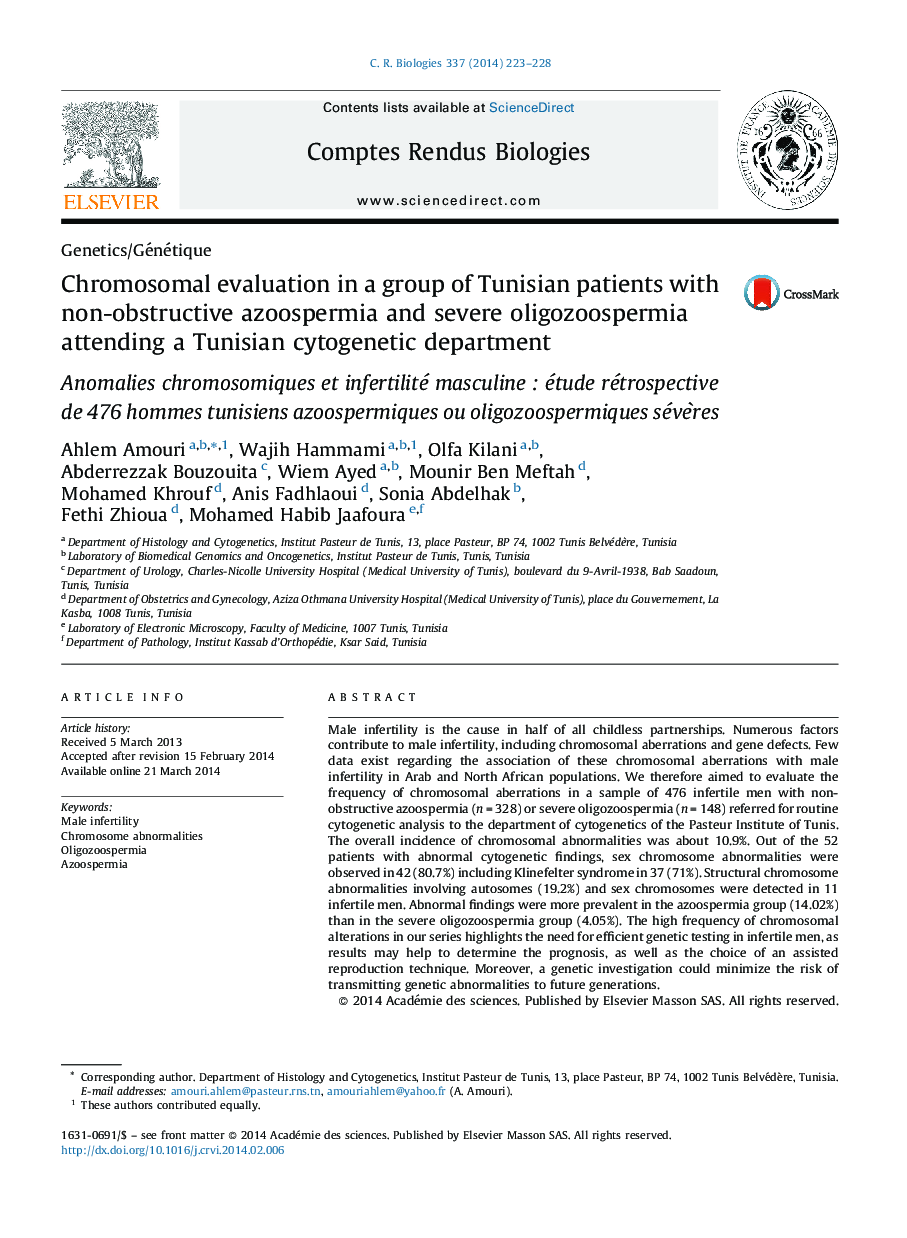| کد مقاله | کد نشریه | سال انتشار | مقاله انگلیسی | نسخه تمام متن |
|---|---|---|---|---|
| 2783525 | 1153752 | 2014 | 6 صفحه PDF | دانلود رایگان |
Male infertility is the cause in half of all childless partnerships. Numerous factors contribute to male infertility, including chromosomal aberrations and gene defects. Few data exist regarding the association of these chromosomal aberrations with male infertility in Arab and North African populations. We therefore aimed to evaluate the frequency of chromosomal aberrations in a sample of 476 infertile men with non-obstructive azoospermia (n = 328) or severe oligozoospermia (n = 148) referred for routine cytogenetic analysis to the department of cytogenetics of the Pasteur Institute of Tunis. The overall incidence of chromosomal abnormalities was about 10.9%. Out of the 52 patients with abnormal cytogenetic findings, sex chromosome abnormalities were observed in 42 (80.7%) including Klinefelter syndrome in 37 (71%). Structural chromosome abnormalities involving autosomes (19.2%) and sex chromosomes were detected in 11 infertile men. Abnormal findings were more prevalent in the azoospermia group (14.02%) than in the severe oligozoospermia group (4.05%). The high frequency of chromosomal alterations in our series highlights the need for efficient genetic testing in infertile men, as results may help to determine the prognosis, as well as the choice of an assisted reproduction technique. Moreover, a genetic investigation could minimize the risk of transmitting genetic abnormalities to future generations.
RésuméOn estime à près de 10 % la fréquence de l’infertilité masculine dans la population humaine. Les causes de cette infertilité sont multiples, notamment génétiques, et plus particulièrement chromosomiques. Dans ce travail, nous avons exploré 476 patients tunisiens présentant des troubles non obstructifs de la spermatogenèse (328 azoospermiques et 148 ayant une oligospermie sévère). Une étude du caryotype constitutionnel est réalisée chez l’ensemble de ces patients, avec marquage chromosomique en bandes RHG. Nous avons pu révéler ainsi 52 anomalies chromosomiques (fréquence 10,9 %), réparties en 46 anomalies gonosomales et 6 anomalies autosomiques. La fréquence de ces anomalies est plus élevée dans le groupe des azoospermies, chez qui la constitution 47,XXY prédominait. Les autres anomalies étaient autosomales, correspondant à des translocations, une inversion et des chromosomes marqueurs surnuméraires. Nos résultats confirment la forte prévalence des anomalies chromosomiques chez les hommes atteints de troubles sévères de la spermatogenèse. Nos chiffres sont comparables à ceux décrits dans la littérature, incitant à la considération de l’étude cytogénétique au cours du bilan d’infertilité masculine et justifiant la pratique systématique du caryotype avant toute tentative de procréation médicalement assistée.
Journal: Comptes Rendus Biologies - Volume 337, Issue 4, April 2014, Pages 223–228
